News Release
Promoting Safety and Peace of Mind in Rice by Reducing Agrichemicals
March 26, 2012
March 26, 2012
Promoting Safety and Peace of Mind in Rice by Reducing Agrichemicals
JA Shimotsuke Introduces a Warm Water Disinfection System
The JA Shimotsuke Seed Center was completed and started operation in February 2012.
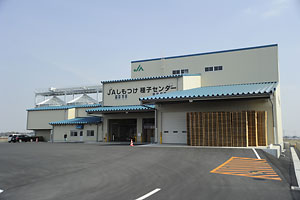 |
| Exterior View of JA Shimotsuke Seed Center |
JA Shimotsuke is located at the southern end of Tochigi Prefecture in an area which consists of 1 city and 2 smaller towns (Tochigi City, Mibu Town and Iwafune Town). The eastern part of the area is known as the Kanto Plains. Rivers running through this area supply abundant water, and 81.4% of the cultivated land in the area is paddy field.
This area mainly produces “Asahino-yume”, a rice variety promoted by Tochigi Prefecture. This variety features a high maturity ratio (yield) with a reasonable price, and it is popular with the food industry. The texture of “Asahino-yume” is less sticky than other types of rice, making it suitable for Japanese rice bowls.
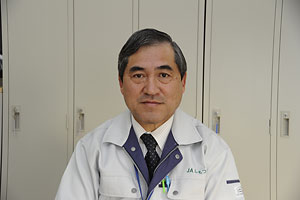 |
| Mr. Yoshikazu Ohashi, JA Shimotsuke |
Mr. Yoshikazu Ohashi, Head of the Agricultural Management Department, says “Few rice producing areas can supply a stable amount of rice with consistent quality.” He seems confident that their rice will continue to enjoy support from the food industry.
It was 8 years ago when the idea first arose to build a new seed center in the area. Official preparations for the new center, which was to replace the crumbling old seed center in Iwafune, started in March 2003. The plan was funded in 2010.
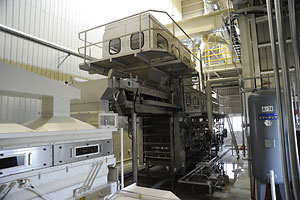 |
| Continuous Disinfection System using Warm Water |
JA Shimotsuke considered how best to elevate even further the reputation of the region as a prime rice producing area for the food industry. It was natural that they adopted the agrichemical-free Disinfection System, because the same system had already been in operation at JA Nasuno in Tochigi Prefecture and was well-known to JA Shimotsuke.
The feature of the Warm Water Disinfection System that was most attractive to JA Shimotsuke was the ability to reduce agrichemicals. Reducing agrichemicals is an excellent way to improve food safety. Mr. Ohashi is proud of JA Shimotuke's commitment to reducing agrichemicals and is confident that this reduction will provide a competitive advantage over other rice producers. Reducing agrichemical use also lowers costs, which will be another advantage over competitors. He also believes that seed disinfected by warm water tends to germinate earlier and have better survival characteristics. “Good seeds become good plants, which become good crops,” he says.
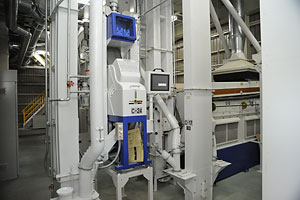 |
| Continuous Disinfection System using Warm Water |
When using warm-water disinfection, it is important to avoid the secondary contamination by microbes of disinfected paddy seeds. The new seed center building is separated into three areas: a material receiving area, a pre-cleaning area, and a disinfection area. This separation greatly reduces the risk of disinfected paddy seeds becoming contaminated by microbes.
The center began full-fledged operation on February 22, 2012. At present, the center can supply paddy seeds disinfected by warm-water or by agrichemicals. They plan to deliver 10 tons of warm-water disinfected paddy seeds this year to farmers in the area surrounding JA Shimotsuke and to increase the ratio of seeds disinfected by warm-water by promoting the capability to their farmers. Mr. Ohashi also plans to supply warm-water disinfected paddy seeds the other JA facilities in Tochigi Prefecture.
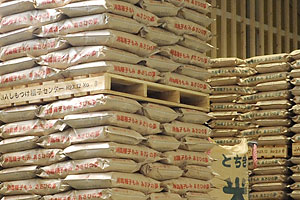 |
| Disinfected “Asahino-yume” Paddy Seeds waiting for delivery |
By aggressively promoting the reduction in agrichemicals, Mr. Ohashi desires to grow “Asahino-yume” into a brand widely known as “safe rice” by the food industry.
* Please note descriptions in news releases are accurate as of the date of release and may differ from the most up-to-date information.
